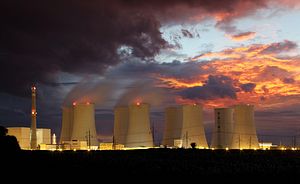The controversy over how and when to begin restarting some of Japan’s nuclear reactors is heating up again, as the government attempts to issue official assurances about safety. At issue is who is actually responsible for the safety of the reactors when and if they are brought back online. After Kyushu Electric Power Co. received an initial safety inspection clearance from the Nuclear Regulatory Authority for its Sendai Nuclear Power Plant in July, it has experienced further setbacks, although it appears to have weathered the public commentary period which ends this Friday. While the government seeks to grant assurances of safety, there is also news of further setbacks at the stricken Fukushima Daiichi nuclear power plant.
As the Wall Street Journal’s “Real Time Japan” section noted Tuesday, there is a lack of clarity as to who is able to give the final go ahead for restarting a nuclear reactor once it has passed the NRA’s screening process. The government is now considering stepping into the breach. Toshimitsu Motegi, minister of economy, trade and industry said “We have received requests from local governments to guarantee the safety of specific plants–for example, in a written statement… We’ll consider what sort of measures we could take to explain [the situation].” The NRA has noted that its role is simply to make sure reactors comply with regulations, not ensure the reactors safety. Local government officials near the Sendai plant want approval from the central government before agreeing to a restart. Thus it appears that Prime Minister Shinzo Abe’s administration is preparing to accept responsibility if it means some reactors can begin to come back online.
While this news suggests that incremental progress is being made toward an initial restart, news from the Fukushima Daiichi reactors continue to influence the public discourse. Tokyo Electric Power Co. (TEPCO) said Tuesday it had failed to complete the “ice wall” meant to contain radioactive water from escaping the Fukushima No. 1 power station, according to the Jiji Press. The problem is with one section of tunnel beneath the reactor, which TEPCO has injected some 400 tons of ice into since July. Its strategy now is to start using filler, beginning in mid-September “at the earliest,” which is expected to finally freeze this last section.
While the government may decide to issue guarantees to local communities about the safety of reactors, the lengthy and difficult NRA screening process will be a much more limiting factor on the number of reactors that can be restarted. Even the Sendai plant, considered one of the most likely to come back online, has experienced further delays that could last well into 2015 because it fell behind on the NRA’s heavy paperwork requirements. The government’s own new stringent regulations are now the cause of Abe’s inability to restart any of the country’s reactors, and with public opposition to bringing back the Sendai plants at 57.9 percent according to the Jiji Press, a more comprehensive national restart looks doubtful.































